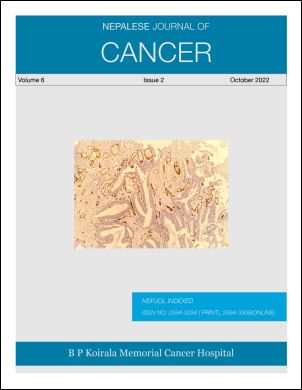Angiogenesis in Colorectal Carcinoma: An Immunohistochemical study
DOI:
https://doi.org/10.3126/njc.v6i2.48772Keywords:
Angiogenesis, Colorectal carcinoma, Microvessel density, CD 34Abstract
Background: Angiogenesis plays an important role in carcinogenesis. Angiogenesis is studied by calculating the microvessel density. The purpose of this study is to determine whether angiogenesis can be documented in colorectal tumor progression and to assess whether the quantification of microvessels can be correlated to tumor aggressiveness.
Methods: This is a hospital based descriptive cross-sectional study, done from August 2015 to July 2016 after obtaining ethical approval from Institutional Review Committee. We quantified microvessel density in colorectal carcinoma. An immunohistochemical study was performed using mouse monoclonal antibody against CD34, which was used for localizing endothelial cell lined blood vessels & cluster of endothelial cells without lumen formation. Counting was done in 10 consecutive high power fields (40x). The data were analyzed after the counting was done.
Results: We compared microvessel density with age, gender, tumor size, histologic differentiation, tumoral invasion, lymph node metastasis and tumor stage. No significant correlation was found between microvessel density and the aforementioned parameters (p>0.05).
Conclusions: The correlation between microvessel density and tumor progression was non-significant. Hence we conclude that there is a need to undertake studies involving larger samples, and also assessment of the other factors associated with angiogenesis should be done to have a better information on prognostic values
Downloads
Downloads
Published
How to Cite
Issue
Section
License
Copyright (c) 2022 Nepalese Journal of Cancer

This work is licensed under a Creative Commons Attribution 4.0 International License.
This license lets others distribute, remix, tweak, and build upon your work, even commercially, as long as NJC and the authors are acknowledged.
Submission of the manuscript means that the authors agree to assign exclusive copyright to NJC. The aim of NJC is to increase the visibility and ease of use of open access scientific and scholarly articles thereby promoting their increased usage and impact.




